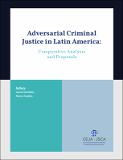| dc.description.abstract |
Latin American criminal proceedings are governed by an accusatory and adversarial sys-tem with the exception of Argentina’s federal justice system and the Brazilian judicial system, which still use a mixed or moderate inquisitorial system. The entry into force of the new federal Criminal Procedure Code (CPC) passed in De-cember 2014 in Argentina has been suspend-ed4, and Brazil continues to use a system whose structure dates back to 1941. The latter model was approved under the authoritarian govern-ment of Getúlio Vargas in the context of the New State that began in late 1937. |

